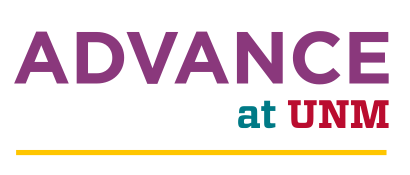UNM assistant professors get guidance on tenure and promotion
UNM junior faculty members heard tips about how to stay on the path to promotion to full professor, including how to interpret mid-pro letters and how to reach out for help and support along the way during a panel sponsored by Advance at UNM.
“You need to identify your top priorities,” said Advance at UNM director Julia Fulghum. That work for assistant professors might include finishing a book, submitting more proposals or presenting at more conferences as well as working on teaching.
Fulghum said it’s up to professors to “choose your own adventure” while still following university procedures for tenure.

Other presenters included Aeron Haynie, executive director of the Center for Teaching and Learning, Tina Takacs-Vesbach, a UNM biology professor, Mary Jo Daniel, director of the Faculty Research Development Office, and Alex Lubin, associate provost for faculty development.
Lubin said faculty members should use their mid-pro letters they recently received to their advantage and that they shouldn’t worry if the mid-pro letter seemed overly critical.
“It is normal to get what might feel like a harsh letter,” he said.
“If you got a harsh letter, don’t feel defeated. Actually what that means is that you’ve got your work cut out for you,” he said.

Takacs-Vesbach, a full professor, said her letter was tough, but in retrospect was true and helped her have a pretty easy time getting tenure.
“We work for this for along time, and we get to this place and it looks like we’re not going to get there,” she said of her initial feelings after receiving the letter.
Takacs-Vesbach said she got back on her path by sketching out what she needed to do, and getting people invested in her work.
Now’s the time to get people to know you. Sometimes just looking at your CV isn’t enough. If you can make that human connection with them, it can put your over the top.”

Daniel encouraged professors to stay focused on their bigger picture of why they do what they do.
“Why are you here?” she said. “What is it that you love about what you do? We can just get overwhelmed with some of the minutiae. Remind yourself why you’re here and what differences you’re going to make in the world.”
Research proposals should include some of that passion, and Daniel said her office is there to help assistant professors.
“We’ve seen the things that can trip up proposals, and we can help take some of the mechanical stuff off your plate,” she said.
Along the way to promotion, assistant professors should be building their teaching portfolios, Haynie said.
“This is the opportunity for you to tell your story…to contextualize the evidence and the experience you have,” she said.
The Center for Teaching Excellence helps with the teaching component of getting tenure, including performing formative teaching evaluations as well as giving syllabus feedback.
For other help, Fulghum encouraged audience members to contact Advance for mentoring and coaching.
“If we can’t help you, we can identify trustworthy senior faculty in your area as well and we are happy to do that,” she said.
